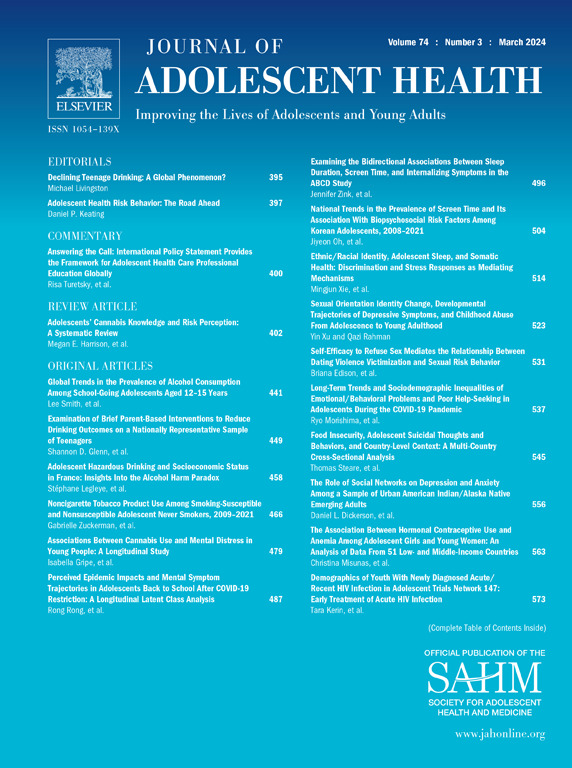Adolescents' Depression Symptoms After Social Distancing and Restrictions: The EpiCoV French Longitudinal Population-Based Cohort
IF 5.5
2区 医学
Q1 PEDIATRICS
引用次数: 0
Abstract
Purpose
The recent worldwide health pandemic and related social distancing and restrictions negatively impacted adolescents' mental health, including depression, underscoring the need for comprehensive understanding beyond immediate impacts. We aimed to identify factors assessed during the first and second lockdowns that were associated with depression symptoms 2 years after restrictions easing.
Methods
This study included 1,946 adolescents, aged 15–18 years, involved in the French Epidémiologie et Conditions de Vie population-based cohort. Depression symptoms were assessed twice, with the nine-item Patient Health Questionnaire, at the beginning of restrictions easing and 1 year later. Logistic regressions were used to estimate associations among sociodemographic, socioeconomics, health, substance use, lockdown conditions, and pandemic-related factors, self-reported during the first and second lockdowns in France, and depression symptoms. Elastic-Net regression was used to study the joint effect of characteristics assessed during both lockdowns.
Results
A total of 472 (25.25%) adolescents reported depression symptoms in the restrictions easing period, 369 (78.18%) were girls and 103 (21.82%) were boys. Factors associated with a higher risk of reporting depression symptoms included being a girl, a smoker, frequently consuming alcohol, having spent lockdowns in a place without outdoor space, poor perceived health, and pre-existing mental disorders.
Discussion
Factors associated with depression symptoms after restrictions easing were well known and mostly not related to social distancing and restrictions, suggesting that already vulnerable youth were more likely to be impacted by the stressful pandemic context. Special caution is needed for these adolescents to limit pandemic's impact on long-lasting mental health. These results also underscore the importance of early identification of at-risk adolescents and the development of interventions to enhance their resilience and support in case of future crises.
社交疏远和限制后青少年的抑郁症状:EpiCoV 法国纵向人群队列。
目的:最近的全球卫生大流行以及相关的社会疏远和限制措施对青少年的心理健康(包括抑郁症)产生了负面影响,这凸显了全面了解直接影响之外的其他因素的必要性。我们旨在确定在第一次和第二次封锁期间评估出的与限制放松两年后抑郁症状相关的因素:这项研究纳入了 1,946 名年龄在 15-18 岁之间的青少年,他们都参与了法国流行病学和生活状况人口队列研究。在放宽限制之初和一年后,使用九项患者健康问卷对抑郁症状进行了两次评估。利用逻辑回归估计了在法国第一次和第二次封锁期间自我报告的社会人口、社会经济、健康、药物使用、封锁条件和大流行相关因素与抑郁症状之间的关系。采用弹性网回归法研究两次封锁期间评估的特征的共同影响:共有 472 名(25.25%)青少年在限制放宽期间报告了抑郁症状,其中 369 名(78.18%)为女孩,103 名(21.82%)为男孩。出现抑郁症状风险较高的相关因素包括:女孩、吸烟、经常饮酒、曾在没有户外活动空间的地方度过禁闭期、健康状况较差以及之前存在精神障碍:讨论:与限制放松后抑郁症状相关的因素众所周知,而且大多与社会疏远和限制无关,这表明本已脆弱的青少年更有可能受到紧张的大流行环境的影响。对这些青少年需要特别小心,以限制大流行对长期心理健康的影响。这些结果还强调了及早识别高危青少年并制定干预措施以提高他们的适应能力和在未来危机中为他们提供支持的重要性。
本文章由计算机程序翻译,如有差异,请以英文原文为准。
求助全文
约1分钟内获得全文
求助全文
来源期刊

Journal of Adolescent Health
医学-公共卫生、环境卫生与职业卫生
CiteScore
10.40
自引率
3.90%
发文量
526
审稿时长
46 days
期刊介绍:
The Journal of Adolescent Health is a scientific publication dedicated to enhancing the health and well-being of adolescents and young adults. Our Journal covers a broad range of research topics, spanning from the basic biological and behavioral sciences to public health and policy. We welcome a variety of contributions, including original research papers, concise reports, literature reviews, clinical case reports, opinion pieces, and letters to the editor. We encourage professionals from diverse disciplines such as Anthropology, Education, Ethics, Global Health, Health Services Research, Law, Medicine, Mental and Behavioral Health, Nursing, Nutrition, Psychology, Public Health and Policy, Social Work, Sociology, and Youth Development to share their expertise and contribute to our mission of promoting adolescent health. Moreover, we value the voices of young individuals, family and community members, and healthcare professionals, and encourage them to submit poetry, personal narratives, images, and other creative works that provide unique insights into the experiences of adolescents and young adults. By combining scientific peer-reviewed research with creative expressions, our Journal aims to create a comprehensive understanding of the challenges and opportunities in adolescent and young adult health.
 求助内容:
求助内容: 应助结果提醒方式:
应助结果提醒方式:


